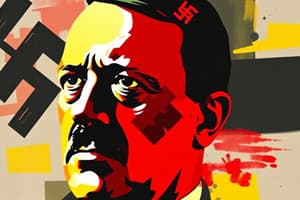Podcast
Questions and Answers
What event set off a series of events that ended with Hitler becoming Führer?
What event set off a series of events that ended with Hitler becoming Führer?
The Reichstag Fire and Reichstag election.
How did Hitler gain enough seats in the Reichstag?
How did Hitler gain enough seats in the Reichstag?
He convinced President Hindenburg to call a new Reichstag election and used the Reichstag fire to persuade Hindenburg to pass an emergency law restricting personal liberty.
What did the Enabling Act give Hitler the power to do?
What did the Enabling Act give Hitler the power to do?
Make laws without the Reichstag's approval for four years.
What was the goal of Hermann Göring as Economics Minister in Germany?
What was the goal of Hermann Göring as Economics Minister in Germany?
What were the measures introduced by Hermann Göring to achieve self-sufficiency?
What were the measures introduced by Hermann Göring to achieve self-sufficiency?
What percentage of food and raw materials was Germany still importing by the outbreak of World War Two?
What percentage of food and raw materials was Germany still importing by the outbreak of World War Two?
What were the three organizations set up by the Nazis for workers?
What were the three organizations set up by the Nazis for workers?
What was the role of the ‘German Christians’ group in the Reich Church during the Nazi regime?
What was the role of the ‘German Christians’ group in the Reich Church during the Nazi regime?
What agreement did Hitler make with the Pope in 1933?
What agreement did Hitler make with the Pope in 1933?
How did the Nazis attempt to suppress the Catholic Church?
How did the Nazis attempt to suppress the Catholic Church?
What were some methods used by the Ministry of Enlightenment and Propaganda to control and influence attitudes?
What were some methods used by the Ministry of Enlightenment and Propaganda to control and influence attitudes?
What is the difference between "opposition" and "resistance" in Nazi Germany?
What is the difference between "opposition" and "resistance" in Nazi Germany?
What factors contributed to the popularity of the Nazi regime?
What factors contributed to the popularity of the Nazi regime?
How did the Protestant Church oppose Hitler?
How did the Protestant Church oppose Hitler?
How did the Catholic Church oppose Hitler?
How did the Catholic Church oppose Hitler?
What were the measures taken by the Nazis to eliminate opposition within Germany?
What were the measures taken by the Nazis to eliminate opposition within Germany?
What was the significance of Hitler becoming Führer in 1934?
What was the significance of Hitler becoming Führer in 1934?
How did the Nazis control the legal system to suppress opposition?
How did the Nazis control the legal system to suppress opposition?
What were the Nazi policies towards the Catholic and Protestant Churches?
What were the Nazi policies towards the Catholic and Protestant Churches?
What were the main methods used by the Nazis to control young people through education?
What were the main methods used by the Nazis to control young people through education?
What were the expectations and roles imposed on women by the Nazis?
What were the expectations and roles imposed on women by the Nazis?
What measures did the Nazis introduce to discourage women from working?
What measures did the Nazis introduce to discourage women from working?
What were the main economic policies implemented by the Nazis?
What were the main economic policies implemented by the Nazis?
Flashcards are hidden until you start studying




